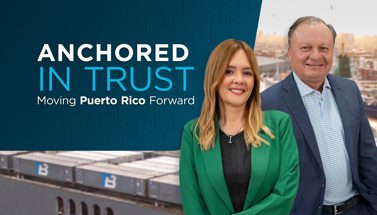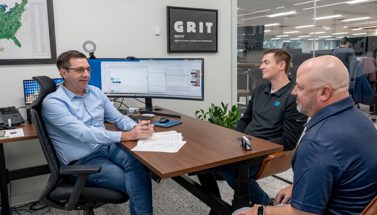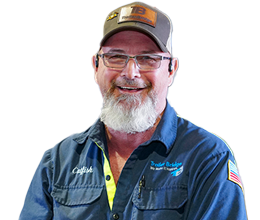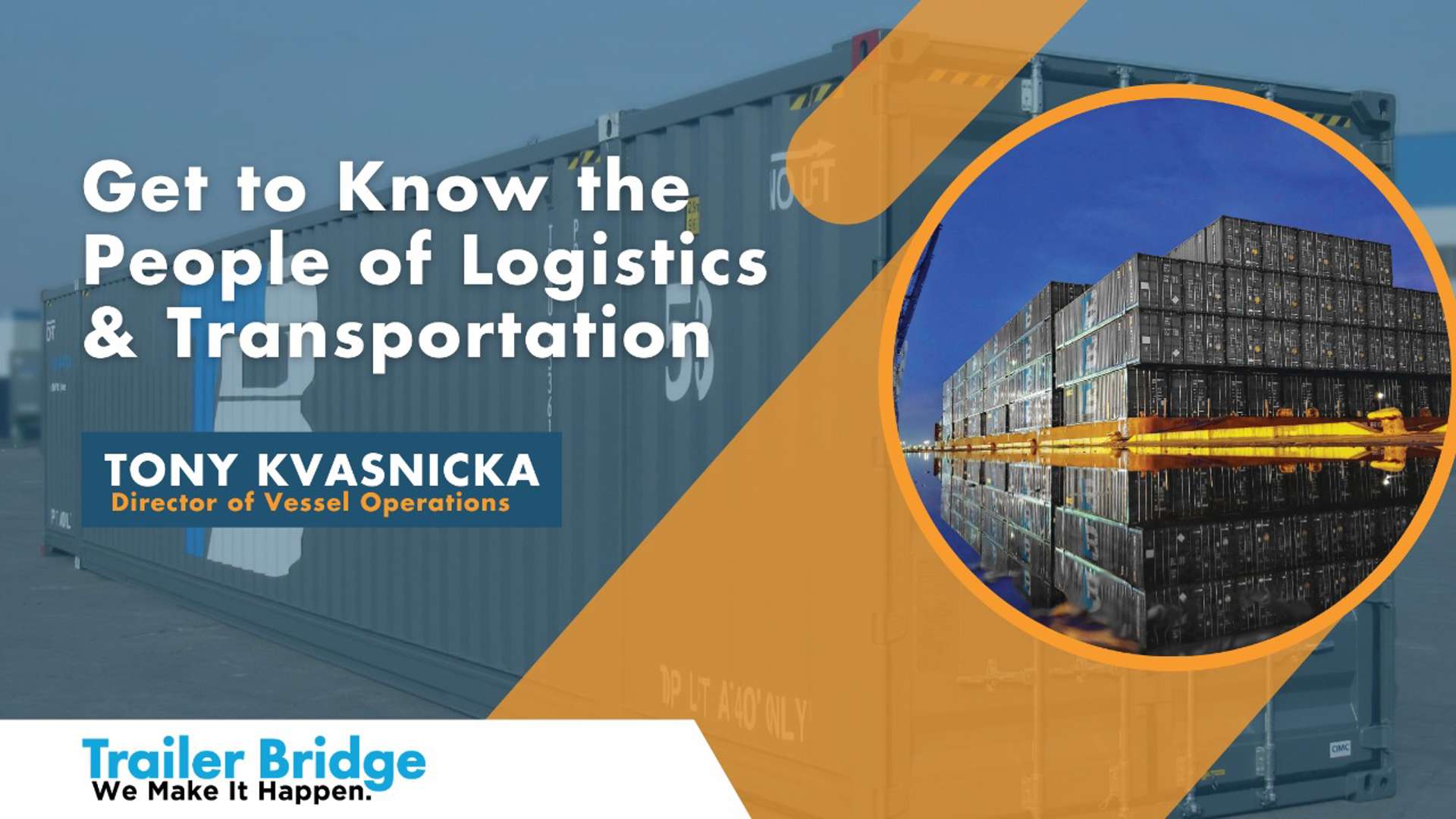
Tony Kvasnicka, Director of Vessel Operations: Get to Know the People of Logistics & Transportation
Have you ever wondered what it might be like to work in transportation and logistics? Perhaps you’re curious about the qualities, traits, and skills that make a person successful in ocean shipping. Tony Kvasnicka, Director of Vessel Operations, has been working here at Trailer Bridge for the past three years. A diverse range of early life and career experiences made him a great fit for this position.
Tony took some time out of his hectic schedule to tell us a little about what he does and how he came to be a part of the TB Family.
A day in the life managing vessel operations
Trailer Bridge owns a fleet of ocean-going barges available for charter. The biggest of these is 737 feet long, 104 feet wide, and 58 feet tall from the bottom to the top. These vast ships weigh around 32 million pounds and cost approximately $100 million to build. The smaller ones are about 400ft and cost around $30-36 million.
A five to seven men crew tug the large barges to Puerto Rico and back. They work 28 days on and 14 days off. There are also assist tugs at the bow and stern of the barges to assist with steering during the transit in and out of port. Under tow, these transport systems are 1500 to 2000 feet long from the front of the tugboat to the back of the barge. They are truly massive.
Tony and his team manage these barges. This involves handling their repair and maintenance, doing drydocks, replacing steel and coatings to ensure they are up to code. “Working in this position requires mechanical aptitude,” Tony explains, “you need to be hands-on and not afraid to get dirty.”
With the barges needing to be fit to sail every Wednesday and Friday, it’s a fast-paced job, and Tony and his team have to be on the ball. His department works some of the longest hours of any company he’s ever worked for, often clocking up as many as 55 hours by Wednesday evening.
However, the fact that Tony loves what he does is apparent just from glancing around his office, which is full of photos of the port. In pride of place is a picture of a RORO coming in at 2am. These ‘roll-on/roll-off’ cargo ships are specifically designed for cargo that is either driven on, such as cars, or loaded using a platform vehicle rather than lifted on via cranes.
These days Tony spends much of his time in the office or out on the road. Yet, he still averages 30 hours a week working directly with the boats. Owning a welding shop in Virginia, where he specialized in steel repair and fabrication, furnished him with many of the skills he uses on a day-to-day basis.
However, Tony stresses that it was his background in farming that truly prepared him for what he does now. “You can treat barges like living things, and that’s the farmer part of me… Farming is a great background for this type of work.”
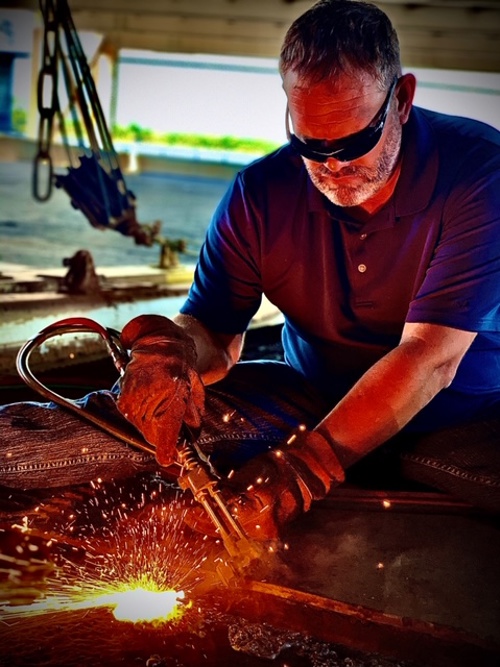
These days Tony spends much of his time in the office or out on the road. Yet, he still averages 30 hours a week working directly with the boats. Owning a welding shop in Virginia, where he specialized in steel repair and fabrication, furnished him with many of the skills he uses on a day-to-day basis.
However, Tony stresses that it was his background in farming that truly prepared him for what he does now. “You can treat barges like living things, and that’s the farmer part of me… Farming is a great background for this type of work.”
Growing up, Tony worked alongside his dad on the cattle farm in Virginia, which had been in his family for over 100 years. It was here that he first learned about machines, taking care of the farm equipment.
Tony also spent 10 years with the Coast Guard, where he cultivated a love of sailing. “It’s beautiful at sea. I’ve sailed all over with the Coast Guard and been in every state on the Eastern seaboard and everybody of water. Sailing is pretty cool,” he says.
It was through connections made there that Tony found his way over to Trailer Bridge. Some 20-odd years later, a friend of his who was working as Manager of Vessel Operations with Trailer Bridge asked Tony if he would be interested in applying for a Port Engineer position.
Around a year after Tony joined Trailer Bridge, his friend left the company, and he took over his job. Tony was promoted again to his present position.
Leadership the Trailer Bridge Way
Tony already had a considerable amount of experience with managing a team. “Early on in the Coast Guard, I had up to 15 guys under me. I was 21 yrs old managing a search and rescue station; even at a young age, I was managing people and handling stressful situations, so that wasn’t a big deal,” he says.
Yet, he feels he benefitted from going through the Leadership Development Program set up by VP of Organizational Development, Indie Bollman. For Tony, the course “solidifies what TB believes in and their culture,” which he describes as distinct from other corporations.
Trailer Bridge just has a different approach to doing business. Over the past three years, Tony’s experiences with the company have shown him that Indie and CEO Mitch Luciano really believe in the ideas they teach through the program and that really makes all the difference.
Tony currently oversees a team of six, although when fully staffed, this number climbs to eight or nine. The company also brings in a lot of subcontractors to handle maintenance and repairs.
The team works really hard to keep the ships in tip-top condition and increase their longevity. “Anyone who’s seen the barges prior to where they’re at today is amazed. The amount of steel and time we put in and the extra vision we have for them”.
Alongside repairs, another key focus of the team is keeping the company competitive in the marketplace. Tony is continually working on diversifying the barges to enable them to carry a greater range of cargo. He explains:
“So we’re doing all these things, but the money we’re spending doing them will make us more flexible and able to pivot. I love the challenge. They give me an idea – ‘can we do this?’ and I get to come back and say, ‘Well, if we do it this way, we can open it up to handle XYZ, and it’s money well-spent.'”
One recent solution Tony drew up was to make one of the essential stern bits on the barges’ main deck removable to allow for the transportation of oversized cargo. He is currently working on additional car panel projects so Trailer Bridge can up their car transporting capacity.
The impact of COVID-19
When the pandemic struck, and other employees were going remote, the nature of his job meant Tony had to work through it. “We have ballast systems to maintain, generators to run, so me and my team have been here every day.”
The pandemic has prevented him from traveling over to Puerto Rico as often as he usually does to set up projects and provide support to his man on the ground there. However, the introduction of safety protocols such as mandatory masks and daily temperature screening has enabled Trailer Bridge to protect our employees while continuing to ship items to where they are needed.



